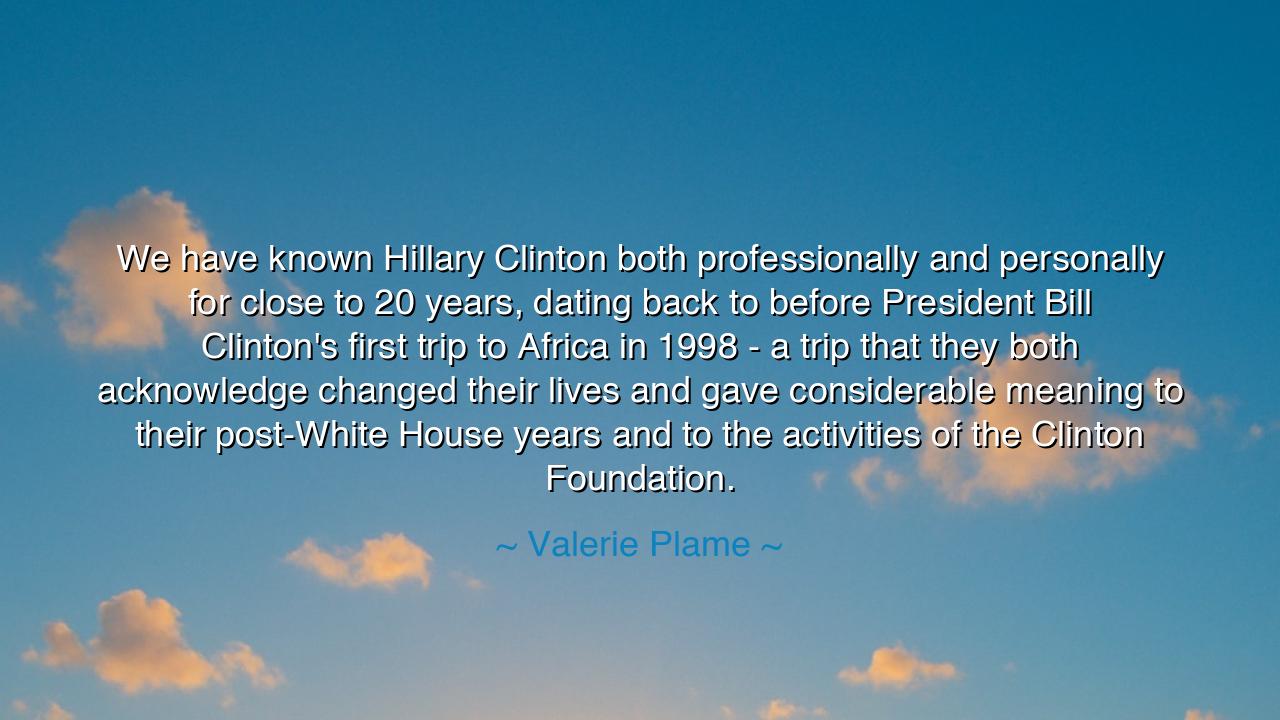
We have known Hillary Clinton both professionally and personally
We have known Hillary Clinton both professionally and personally for close to 20 years, dating back to before President Bill Clinton's first trip to Africa in 1998 - a trip that they both acknowledge changed their lives and gave considerable meaning to their post-White House years and to the activities of the Clinton Foundation.






In the chronicles of public duty and private bond, a witness speaks with the gravity of years: “We have known Hillary Clinton both professionally and personally for close to 20 years, dating back to before President Bill Clinton’s first trip to Africa in 1998—a trip that they both acknowledge changed their lives and gave considerable meaning to their post–White House years and to the activities of the Clinton Foundation.” So says Valerie Plame, and her sentence moves like a procession—measured, ceremonial, bound by memory. It names two strands that often fray in public life—service and friendship—and binds them together with time. The claim is not merely that they knew; it is that they watched an inflection point: a journey that turned the compass of two lives.
Hear the layers within the words professionally and personally. In the first, we find the discipline of statecraft—briefings, convoys, the iron etiquette of protocol. In the second, we find handshakes that linger into friendship, letters that outlast elections, the human warmth that keeps the machinery from grinding the soul. To hold both is rare. Plame’s line testifies that the judgment offered is not the flattery of a stranger, but the reckoning of one who has stood near enough to see the seams and still speak of meaning without irony.
Consider the origin named: Africa, 1998. The itinerary was not only geography; it was catechism. In halls where new democracies rehearsed their voices and in villages where the dust remembers grief, the travelers saw the scale of need and the grandeur of resilience. The aftershocks of genocide, the surge of HIV/AIDS, the stubborn hope of schools built with more faith than wood—these were not abstractions. When Plame says the trip changed their lives, she points to the ancient truth that roads change those who walk them: vision widened by witness, priorities rearranged by proximity to the world’s open wound.
From such witness came a redirection of vocation. The phrase post–White House can sound like twilight; in this telling, it is dawn. Freed from the daily furnaces of office yet bound by the memory of what they had seen, the Clintons turned toward work that would carry the scent of that journey: convening partners, courting commitments, pressing for vaccines and schools, capital and clinics—the slow, stubborn grammar of repair. Thus the Clinton Foundation appears not as a monument but as a workshop whose blueprints were sketched on that early passage through Africa.
Let a companion story stand beside this. Years after a president’s convoy rolled through a capital, a nurse in a provincial clinic received a shipment that made the difference between waiting and healing. She did not know the names on the plaques; she knew the faces of children who woke without fever. This is how journeys justify themselves: not by speeches remembered, but by fevers that are not. A trip becomes a thread; a thread becomes a net; a net, in season, becomes shelter.
Plame’s sentence is also a lesson in testimony. To say “we have known…for close to 20 years” is to pledge one’s reputation to the shape of another’s character. It is the ancient practice of vouching—costly, if careless; precious, if true. In an age fond of instant verdicts, her cadence slows the listener: attend to duration, to dating back, to what was seen before the banners and after the ballots. The measure of a life is not an hour’s headline but a harvest gathered over many seasons.
What, then, is the wisdom to carry forward? First, let your professional duty and personal kindness feed each other rather than starve each other. Second, seek pilgrimages that teach you what spreadsheets cannot; choose at least one trip that rewrites your priorities. Third, do not wait for titles to act—let your post–White House be whatever season follows your own peak of influence, and work there with undiminished courage. Fourth, build institutions not as trophies but as tools; let foundations—of any kind—serve the people whose faces you cannot forget.
Take these counsels as provisions. (1) Keep a ledger of encounters that moved you—names, places, and the change they require—and review it when your zeal thins. (2) Pair every journey with a concrete vow: one school supported, one clinic supplied, one scholarship endowed. (3) Ask elders for the story of the moment that changed their lives; then ask what daily practices kept that moment from fading. (4) When you vouch for another, let it be from years of seeing, not days of applause. Do this, and your own record will read like Plame’s: memory turned into mission, acquaintance ripened into witness, and a single road—perhaps to Africa, perhaps only across town—giving meaning to the work that follows after the trumpets are silent.






AAdministratorAdministrator
Welcome, honored guests. Please leave a comment, we will respond soon